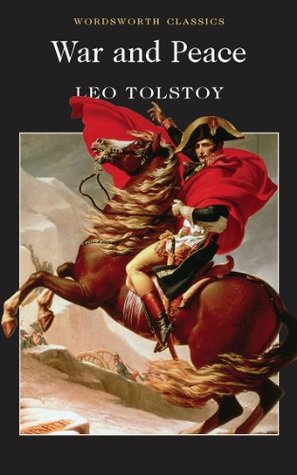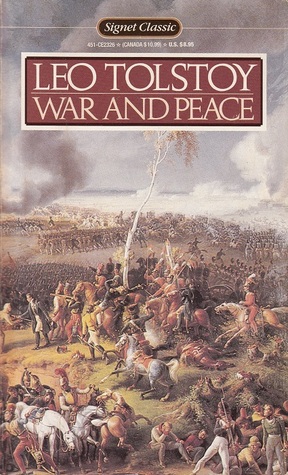A New Favourite: Leo Tolstoy's War and Peace
I watched the 2016 BBC mini-series a few months ago, which made me want to read the book. In case you don't know, the book is a monster, and it took me exactly 2 months to read. I read the ebook, not the physical book pictured, for this reason.
War and Peace takes place in Russia during the wars with Napoleon (1805-1813, although the epilogue happens in 1820). It was first published in 1865, making it historical fiction. The book's mostly about four aristocratic families during this time. I loved it. I'll try to avoid very specific spoilers, but if you don't realise that characters are going to die, go back and read the first sentence of this paragraph.
The good
- An epic story of people fighting for their world and what or who they love (hence the similarity to Tolkien)
- A rich, engaging setting (just like Tolkien...)
- Philosophically rich (also like Tolkien) which is interesting when explored through the characters
- Interesting, complex, developed characters (I found them much more complex and developed than those in Austen or Tolkien - Tolstoy just seems to know people incredibly well)
- Interesting, complex, developed female characters (although women in this setting know their place, the women of War and Peace include some fascinating characters. However, there was one sentence about a woman who "slew hundred of the French", so they weren't all sitting at home. Awesomely, this woman actually existed.)
- It made me laugh (one character doesn't pronounce his Rs, a bear gets tied to a policeman and thrown in the river, several characters are (unintentionally) very very gay to a young 21st Century reader...)
- It made me sad (lesson learnt: don't get attached to emo Russian princes)
- Heaps of drama (similar to Jane Austen - particularly the family and relationship dramas)
- Heaps of angst (between Pierre, Andrei, and Marya, there is a lot of melancholy)
- Foreshadowing. Two characters' deaths (which I knew about because of the mini-series) were foreshadowed in one chapter, and it broke my heart.
- Tolstoy's similes, metaphors, and analogies are entertaining. Sometimes, they help you to better understand a situation. Sometimes, they're less simile and more description of what's actually happening.

The bad
- Russian characters all have a bazillion names (thanks, Russian naming customs) which is very confusing. When you add in the fact that this translation Anglicises certain names, well...
- Polish characters' names aren't even pronounceable
- Rumoured incest (however, I don't think they actually have an affair, unlike in the mini-series)
- Certain characters disappear for no reason and there's no word on what happens to them (one family lost two of their grown-up children, but we don't know anything about their reaction. Another minor character I grew attached to, due to her being so mysterious, disappeared after the last chapter - there was no mention of her in the epilogue, even though she'd been in the background the whole book. What?)
- Structure - similar to Tolkien, sometimes when there's a change of POV, the book goes back in time a bit, which is confusing.
The ugly
- It's ~1300 pages long! No book has the right to be that long.
- The scenes about war strategy and philosophy, and about history, are incredibly boring and I didn't follow. It's okay when they relate to certain characters, but sometimes they're just essays that don't specifically relate to the book.
- The epilogues. That's right, epilogues. Plural. The first epilogue was set about 7 years after the end of the book, and it didn't give me warm fuzzy feeling about the characters' fates, although some of them were described as being happy. The second epilogue was about 40 pages of Tolstoy philosophising about history, and may as well have been published separately. I've seen people say to skip the epilogues, and I agree: the last 100 pages can be skipped without losing anything.

The conclusion
- I've found a new favourite book! How exciting!
- I know I recently talked about not judging intelligence by the books you read, but I feel smarter after reading this.
- Strongly recommend to fans of historical fiction and classic literature.
- Will I read it again in my lifetime? Not sure. Maybe when I'm 50 I'll think about it.
The summary
Tolstoy's epic masterpiece intertwines the lives of private and public individuals during the time of the Napoleonic wars and the French invasion of Russia. The fortunes of the Rostovs and the Bolkonskys, of Pierre, Natasha, and Andrei, are intimately connected with the national history that is played out in parallel with their lives. Balls and soirees alternate with councils of war and the machinations of statesmen and generals, scenes of violent battles with everyday human passions in a work whose extraordinary imaginative power has never been surpassed.
The prodigious cast of characters, seem to act and move as if connected by threads of destiny as the novel relentlessly questions ideas of free will, fate, and providence. Yet Tolstoy's portrayal of marital relations and scenes of domesticity is as truthful and poignant as the grand themes that underlie them.





